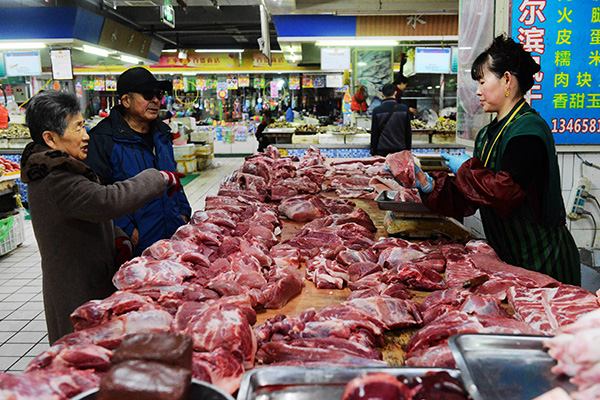 |
|
Two senior people buy pork at a farmer's market in Qingdao, Shandong province. According to media reports, people in Asia consumed 6 billion tons of processed meat in 2014. [Photo/China Daily] |
On Oct 26, the World Health Organization's International Agency for Research on Cancer released the report, based on hundreds of studies, which said processed meat could increase risk of colon cancer. It even said unprocessed red meat like beef, mutton, steak and lamb shanks could be "possibly carcinogenic".
The global processed meat industry, whose sales are worth hundreds of billions of dollars each year, was not amused by the WHO report that included their products in the same category as smoking and asbestos.
The WHO report shook even stock markets. Shares of companies that produce meat fell sharply in China, the US and Italy, to name just a few. And if that was not enough, sales volume of meat products dropped 20 percent in Italy alone in the week following Oct 26.
Meat industry associations in China, North America and South Korea labeled the WHO report variously-"irrational", "irresponsible", "dramatic", "over-exaggerated", "regrettable". Barnaby Joyce, Australia's agriculture minister, said by putting sausages and cigarettes in the same category, the WHO report had become a farce. Some experts even called it fake science.
The industry's indignation may seem justified if you consider that only a small fraction (34,000) of the 8.2 million cancer deaths in 2012, the latest year for which WHO data is available, was attributed to diets rich in processed meat.
Meat consumers' reactions were no less emotional. "Let's enjoy bacon and abolish the WHO," some contested, citing Susan Jones, a bacon-loving 116-year-old US woman, as proof that eating red meat does not necessarily shorten life. Jones stuck a slogan on her kitchen wall: "Bacon makes everything better." Or, such people seemed to say, food is a way to enjoy life.
I am not a vegetarian but I think aroma and taste are not natural guardians of health. I feel concerned about my friends' children who can't have a meal without ham, bacon or sausages, a lifestyle that could make them prone to obesity, high blood pressure or diabetes at a very early age.
Meat is now a need in most cultures and sometimes a must in people's diets. According to media reports, people in Asia consumed 6 billion tons of processed meat in 2014 while people in the US alone ate 4.4 billion tons.
The pursuit of protein in meat has led people to some extreme practices. Various additives are often overused to tickle the taste buds. To improve meat output, some animal husbandry companies overuse or abuse antibiotics to promote animal growth.
In a 2014 report based on surveys conducted in 114 countries, the WHO said it found antibiotic resistance in all the countries in treating seven most common diseases such as blood infection, diarrhea, pneumonia, urinary tract infection and gonorrhea.
